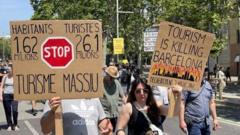Residents and tourists clashed in a series of protests across Barcelona as locals called out the impact of overwhelming tourist crowds on their daily lives. Marchers vocalized their concerns, shouting "Go Home!" at bewildered tourists capturing memories on their smartphones. Cafes filled with unsuspecting visitors faced unexpected squirt gun antics, while luxury boutiques saw their windows plastered with protest stickers denouncing the overwhelming presence of tourists.
Tourism in Barcelona is a significant boon to the economy, drawing over 15 million visitors last year—outnumbering the city's population nearly tenfold. However, local residents argue that the rampant growth is compromising their quality of life. Marina, a local housing advocate, shared her frustration, waving a homemade sign that read "Your Airbnb used to be my home." She explained, "The high rents, driven by short-term rentals and expatriates, are making it impossible for us to live here."
The protestors marched towards the famed Sagrada Familia, the iconic basilica designed by architect Antoni Gaudí, where they echoed sentiments of moderation in tourism. "We’re not against tourism itself; we want sustainable tourism that doesn’t displace us," said Elena, a young marine biologist. "Young people can’t even afford basic necessities like coffee here."
The urgency of the housing crisis is acute. Eighty-year-old Pepi Viu recently found herself homeless after being evicted from her long-time residence, pushed out in favor of more profitable tourist rentals. "I have nowhere to go; housing should not be a business," she lamented while living in a hostel. Rent prices in some neighborhoods have skyrocketed nearly 70% in recent months, forcing many longtime residents to seek sanctuary where they can.
Others are fighting to retain their homes, such as Joan Alvarez, who has resisted leaving his family apartment for over 25 years despite a landlord's attempts to raise rent. "It’s about more than money; it’s about the community that remains here," he asserted.
In response to the growing unrest, Barcelona's authorities announced an upcoming ban on short-term rentals for tourists, set to take effect in 2028, affecting around 10,000 landlords. Critics like Jesus Pereda, who operates two tourist rentals, warn that they are being unfairly blamed for the housing crisis. "Rent prices have risen despite a freeze on new licenses; we’re not the problem," he argued.
While he understands the frustrations of residents, he shared concerns that tourism is vital for Barcelona's economic health and helps support local businesses.
The protests culminated in fiery displays, with chants of “You’re all guiris!” (local slang for foreigners) and the detonation of firecrackers, as police blocked access to major tourist hotspots like the Sagrada Familia. Parallel demonstrations unfolded across Spain and its Southern European neighbors, demonstrating a growing chorus of voices demanding equity in managing the challenges posed by tourism, as the nation gears up for another busy summer season.
Tourism in Barcelona is a significant boon to the economy, drawing over 15 million visitors last year—outnumbering the city's population nearly tenfold. However, local residents argue that the rampant growth is compromising their quality of life. Marina, a local housing advocate, shared her frustration, waving a homemade sign that read "Your Airbnb used to be my home." She explained, "The high rents, driven by short-term rentals and expatriates, are making it impossible for us to live here."
The protestors marched towards the famed Sagrada Familia, the iconic basilica designed by architect Antoni Gaudí, where they echoed sentiments of moderation in tourism. "We’re not against tourism itself; we want sustainable tourism that doesn’t displace us," said Elena, a young marine biologist. "Young people can’t even afford basic necessities like coffee here."
The urgency of the housing crisis is acute. Eighty-year-old Pepi Viu recently found herself homeless after being evicted from her long-time residence, pushed out in favor of more profitable tourist rentals. "I have nowhere to go; housing should not be a business," she lamented while living in a hostel. Rent prices in some neighborhoods have skyrocketed nearly 70% in recent months, forcing many longtime residents to seek sanctuary where they can.
Others are fighting to retain their homes, such as Joan Alvarez, who has resisted leaving his family apartment for over 25 years despite a landlord's attempts to raise rent. "It’s about more than money; it’s about the community that remains here," he asserted.
In response to the growing unrest, Barcelona's authorities announced an upcoming ban on short-term rentals for tourists, set to take effect in 2028, affecting around 10,000 landlords. Critics like Jesus Pereda, who operates two tourist rentals, warn that they are being unfairly blamed for the housing crisis. "Rent prices have risen despite a freeze on new licenses; we’re not the problem," he argued.
While he understands the frustrations of residents, he shared concerns that tourism is vital for Barcelona's economic health and helps support local businesses.
The protests culminated in fiery displays, with chants of “You’re all guiris!” (local slang for foreigners) and the detonation of firecrackers, as police blocked access to major tourist hotspots like the Sagrada Familia. Parallel demonstrations unfolded across Spain and its Southern European neighbors, demonstrating a growing chorus of voices demanding equity in managing the challenges posed by tourism, as the nation gears up for another busy summer season.




















